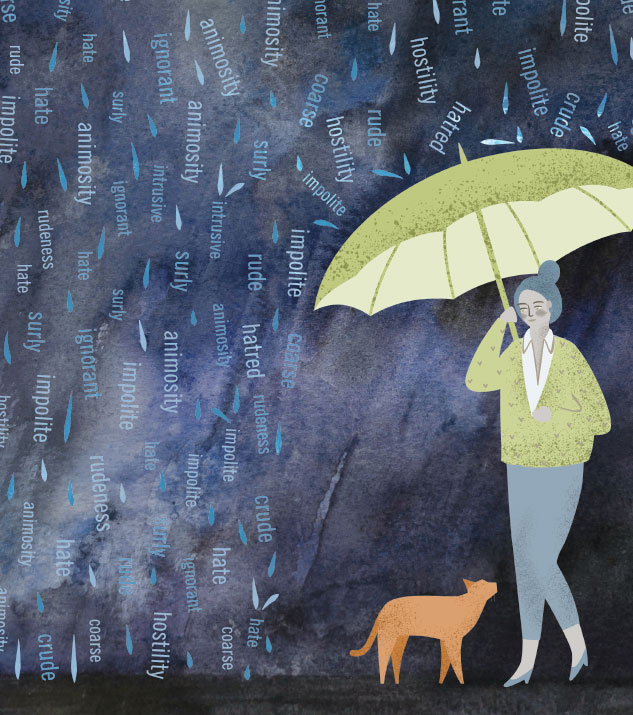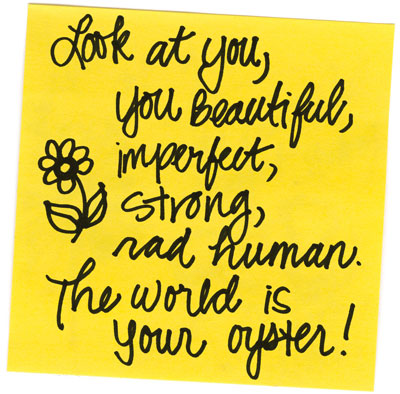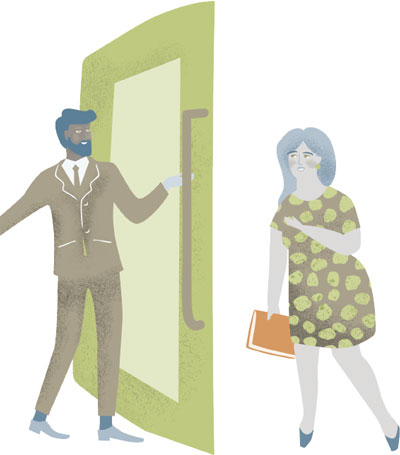Standing Up for Civility, Helpfulness and Respect

Have you noticed that rudeness is on the rise? A nationwide survey, Civility in America 2018, reports that Americans personally experience more than 10 uncivil encounters a week, on average. The country needs an influx of kindness.
Jaime Winston MARKETING & COMMUNICATIONS
Weber State University geosciences professor Carie Frantz smiled, gazing at the note she posted on the mirror: “Look at you, you beautiful, imperfect, strong, rad human. The world is your oyster!
The message went out to anyone who needed it — on a yellow sticky note with Frantz’s sketch of a flower accompanying her elegant cursive. Before leaving the women’s restroom on the third floor of Tracy Hall Science Center, she taped a second note to the mirror, a small card actually. It had instructions: “Leave a kind, positive note for someone to find.”
And find they did. An hour later, Frantz rediscovered her card with someone else’s uplifting message to the world at the Starbucks downstairs.
Across Ogden, Mike McBride, Ogden City marketing and communications manager, was training for a marathon when he came across a string of papers on the ground. “They were probably strung out for at least 30 or 50 yards,” he said. McBride thought back to a card he had received that instructed him to: “Pick up 10 pieces of trash within your community.” He stopped running and began to collect the papers, only to discover they were tax documents.
McBride returned them to a relieved neighbor who mistakenly left them on the roof of her car before driving away. “She just couldn’t thank me enough,” he said.
What exactly were these cards that were inspiring people across campus and the community to spread kindness?

They were part of the Civility Quest Challenge, a collaboration between WSU, Ogden City and local businesses. The weeklong challenge kicked off on April 6, 2018, with events at WSU’s Stewart Bell Tower and Ogden’s 25th Street, and culminated with a celebration on April 12, 2018, World Civility Day. The idea was to engage people in simple behaviors that remind us to live and act as a community.
Challenges ranged from creating a sign or chant to demonstrate an issue you’re passionate about, to showing kindness to animals, to picking up garbage. After completing each quest, participants handed off their cards to somebody else — literally passing on the challenge to spread civility and kindness. Participants then shared their experiences on social media using hashtags #CivilityIs and #WSUCivilityQuest.
“I really appreciate the idea and the message of spreading kindness and decency,” Frantz said. “So many of the cards were just a nice way we should be treating each other. It was a nice reminder to actively think about doing it.”
Why Civility?
The Civility Quest Challenge was one of many civility-based programs featured in the 2017-18 Engaged Learning Series, organized by WSU’s Center for Community Engaged Learning (CCEL).
Every year, CCEL comes up with a new theme for its Engaged Learning Series, looking at issues through six prisms: cultural, economic, educational, health, political and environmental. The 2016-17 theme was privilege, featuring events like Art as a Change Agent, a student art gallery exploring themes of privilege and how art can be used for social activism and advocacy.
Teresa Martinez BS ’11, MHA ’14, CCEL program coordinator, said she became involved in the Engaged Learning Series halfway through the privilege theme. As she began to brainstorm about the next year’s topic, she learned civility was a theme that hadn’t been chosen yet.
“Civility is the practice of giving of yourself to better the community,” Martinez explained. “Someone needs a helping hand, so you help; you notice a flower that needs to be planted because it impacts the bees, so you do it — that’s how I’ve viewed civility
“I felt it was a timely topic,” she said.
Forrest Crawford BS ’75, professor of teacher education and former WSU assistant to the president for diversity, agreed. He said that, unfortunately, incivility is commonplace in our present culture, emphasized even, and that’s something we need to think about as individuals and as a society.

“One of the things that I have viewed about our civility movement is that it’s not an effort to beat people over the head and force them to change,” Crawford said, “but to have people reflect and authentically grapple in their own thinking about how they see the world around them.”
Paige Berhow, a former WSU police officer and owner of local gift delivery company Deliberate Kindness, said the topic of civility was important, especially in today’s negative climate. “I’m pushing 60, and I don’t remember a time that people were more antagonistic toward ;each ;other,”she said. “There have always been political differences, but it just seems like now there’s no civil discussion. What appealed to me about the Civility Quest is it really was an effort to get people to connect.”
Berhow’s Civility Quest card instructed her to refrain from complaining for a whole day. “I’d be lying if I said I completed it successfully,” she said. “But, during that week, we put Civility Quest cards in the boxes we delivered and posted cards every day on our social media.”
During the year of civility, Martinez organized events dealing with politics, diversity, the environment and even the Thanksgiving dinner table, with political science professor Leah Murray encouraging people to share and listen with humility and to remember that problems are wicked, not people. Along with Civility Quest, the Engaged Learning Series featured performances, book readings, lectures and more to promote diversity and civil discussion, including a lecture by philosopher and political activist Cornel West.
Martinez was sad to see the year of civility end.“But,”she said, “my hopes are that people will take it upon themselves to act with civility regardless.”
A WSU Tradition
Crawford asks the university not to rest on its laurels and to continue trying to “get it right.”
According to Crawford, Weber State’s civility, diversity and engaged learning initiatives are changing how the university sees itself and how it does business. If WSU conveys a trite, narrow scope of this identity, he said, it risks falling short of letting the community know “you belong and are welcomed here.”
While the 2017-18 academic year will be remembered as WeberState’s year of civility, the roots of WSU’sfriendly, civil nature took hold decades ago:
“To a stranger or a new student, perhaps the most striking thing about Weber College is its tradition of friendliness. It is a tradition that I hope will never disappear from our campus . . . I hope that you make a lot of friends. This is the easiest thing in the world to do here at Weber.” — Henry Aldous Dixon, Weber president from 1919-1920 and 1937-1953, WC Handy Book, 1951–1952
Engaged Learning Series: Matter of Fact
The 2018-19 Engaged Learning Series theme is “Matter of Fact?”
It focuses on what is fact and what is opionion, where people get
their news and how to tell if information is accurate.
Read more here.
